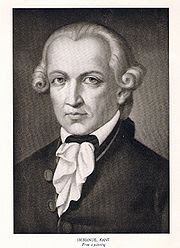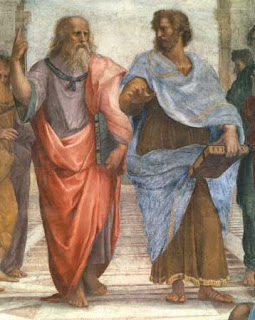
Introduction to Ethics – Aquinas
Introduction
St. Thomas Aquinas (1224-1274) Dominican friar, lectured at the University of Paris and in Naples. He wrote the Summa Theologica, or summary of theology.
Aquinas synthesized Aristotle’s method and principles with Christian theology. His teachings would later be called Thomism, and be accepted by the Catholic and later the Protestant churches until the Scientific Revolution and the Enlightenment. Thomism is the belief in: (1) Ptolemy’s astronomy, (2) Galen’s medicine and (3) Aristotle’s physics. Such was the reverence for Aristotle, held by medieval thinkers that they referred to him as the Great Teacher.
The Summa can be divided into four parts: (1) God, creation and human nature, (2) the human end and the role of human virtue in accomplishing that end (sounds Aristotelian); also specific virtues and morality, (3) life of Christ, role of the sacraments. Although Aquinas emphasizes the role of Scripture and revelation, he also relies upon Reason and philosophical argumentation in order to make his points.
Aquinas named four cardinal virtues (like the four gospels, points of the compass, basic Aristotelian elements, etc.). They are: (1) Fortitude (2) Justice, (3) Prudence (4) Temperance. Of these four virtues, he asserted that justice was the chief among them, mainly because it dealt with the public good (community and church).
The Human End
Aquinas describes Nature/Creation as, “Every kind of thing has a nature that aims to achieve its specific perfection, which is its end.” Recall Aristotle’s telos (goal/aim)- in that acorns become oak trees and puppies become dogs. Whatever a thing aims to achieve, or what it “knows” how to become, is its specific perfection. For Aquinas, babies become adults capable of rational functions, understanding and reason. “And because the power of reason is the specific perfection of human beings, they attain their ultimate perfection, the state of happiness, by activities of reason and activities in accords with reason.”
Aquinas does not think human happiness depends upon material goods (although like Aristotle, he thinks good health and moderate wealth are important). Rather, “…human happiness is a condition of the soul produced by activities of reason and other human activities in this life in accord with reason.” On these points Aristotle and Aquinas agree.
However, the two parts ways on what constitutes the activities of reason, or the aim of reason. Aquinas thinks the aim of happiness is, “…the intellectual vision of God’s essence, albeit not a comprehensive vision.” Aquinas asserts that human reason can produce a vision of God, but cannot create a comprehensive vision without God’s assistance. “Human beings will not be perfectly happy so long as there remains something more for them to know, that nature constitutes them to seek and know God, and that they cannot in this life know what God is in himself.” In this life humans gain knowledge through perceptible effects, that is, one can perceive God as the cause of so many perceptible effects, for example, an orderly universe suggests one who ordered it.
Aristotle was content with the pursuit of theoretical reason. He asserted that the most important ingredient in human happiness is the pursuit of understanding; that is, seeking to understand how things come to be: (contemplation of their efficient, formal, final and material causes). Recall that for Aristotle, politics was the highest pursuit of virtue, that is, a life in service of an earthly kingdom.
Like Aristotle, Aquinas values theoretical reason and the contemplation of causes. Moreover, Aquinas agrees that in order to be happy one needs health, material goods and friends. However, “…he insists that the happiness attainable in this life is incomplete and imperfect, a pale reflection of the perfect happiness of beholding God’s essence…”
“Both Aristotle and Aquinas recognize that human happiness in this life also requires right reason to govern external actions and internal emotions, and a rightly ordered will regarding the requisite ends of human actions and emotions.” However, Aquinas goes farther. He insists that a rightly-ordered will means not only directing your actions in accord with right-reason, but also loving as good whatever God wills. “For Aquinas, there is no complete rectitude of the will without conformity to God’s will and his commands, which reason and revelation communicate.”
“…despite the large measure of agreement that Aristotle and Aquinas share regarding the human end, they differ sharply about the sufficiency of theoretical and practical wisdom in this life for the complete happiness of human beings. On the one hand, the pagan Aristotle does not conceive God in providential terms, and so he does not look to happiness in a future life as the final goal of human beings. On the other hand, the Christian Aquinas conceives God in such terms, and so he cannot look to the theoretical or practical wisdom accessible to humans in this life…short of the beatific vision- as the ultimate human end.” For Aquinas, as with most Christian theologians, the consummation of the beatific vision is accomplished only after death, when one faces God. The beatific vision is the ultimate human end for two reasons: (1) it is the ultimate good or happiness and (2) it is what the human intellect desires, by its very nature.
Thus, for Aquinas, “…human beings can attain an incomplete and imperfect happiness in this life by their natural power to acquire intellectual and moral virtue, but that they cannot by their natural power acquire the complete and perfect happiness of the beatific vision.” The beatific vision is a gift of God, and therefore it must be given by God to humans. “God endows human beings with the requisite freedom and grace to carry out his will and thereby provides the requisite means for human beings to qualify for the complete and perfect happiness of the beatific vision. But however much human beings may cooperate in the dispositions of themselves for the beatific vision, the vision itself remains beyond their natural power to attain.” The beatific vision compliments the natural desire of human beings.
The Cardinal Virtues
Plato describes the four cardinal virtues in The Republic to be:
• Wisdom (calculative) - see the whole
• Courage (spirited) - preserve the whole
• Moderation (appetitive) - serve the whole
• Justice (founding/preserving virtue) - "mind your own business" ie "tend to your soul"/"know yourself"
Plato defines how an individual can attain these virtues: Wisdom comes from exercising reason; Courage from exercising emotions or spirit; Moderation (sometimes "temperance") from allowing reason to overrule desires; and from these Justice ensues, a state in which all elements of the mind are in concord with one another
Plato identified them with the classes of the city described in The Republic and with the faculties of man. Temperance was associated with the producing classes, the farmers and craftsmen, and with the animal appetites; fortitude with the warrior class and with the spirited element in man; prudence with the rulers and with reason. Justice stands outside the class system and divisions of man, and rules the proper relationship among the three of them.
Justice is described by Plato to be the founding and preserving virtue because only once someone understands justice can he or she gain the other three virtues, and once someone possesses all four virtues it is justice that keeps it all together.
In some Christian traditions, there are four cardinal virtues:
• Prudence - able to judge between actions with regard to appropriate actions at a given time
• Justice - proper moderation between self-interest and the rights and needs of others
• Restraint or Temperance - practicing self-control, abstention, and moderation
• Courage or Fortitude - forbearance, endurance, and ability to confront fear and uncertainty, or intimidation
The term "cardinal" comes from the Latin cardo or hinge; the cardinal virtues are so called because they are hinges upon which the door of the moral life swings.
It may have been taken up from there into Jewish philosophy; Wisdom 8:7 reads, "She [Wisdom] teacheth temperance, and prudence, and justice, and fortitude, which are such things as men can have nothing more profitable in life."
These "cardinal" virtues are not the same as the three theological virtues: faith, hope, and charity (see 1 Corinthians 13). Together, they comprise what is known as the seven cardinal virtues, also known as the heavenly virtues.
The final version of Cardinal Sins consists of: wrath, greed, sloth, pride, lust, envy, and gluttony.
Biblical Lists
In the book of Proverbs, it is stated that "the Lord" specifically regards "six things the Lord hateth, and the seventh His soul detesteth." Namely
• Haughty eyes
• A lying tongue
• Hands that shed innocent blood
• A heart that devises wicked plots
• Feet that are swift to run into mischief
• A deceitful witness that uttereth lies
• Him that soweth discord among brethren
While there are seven of them, this list is considerably different from the traditional one, the only sin on both lists being pride. Another list of bad things, given this time by the epistle to the Galatians includes more of the traditional seven sins, although the list is substantially longer: adultery, fornication, uncleanness, lasciviousness, idolatry, witchcraft, hatred, variance, emulations, wrath, strife, seditions, heresies, envying, murders, drunkenness, revelling, " and such like"
Justice
Defining justice
Aquinas defines justice as, “…the habit whereby one with steadfast and enduring will renders to others what is due them” (34).
Whereas Aristotle defined justice in terms of the restoration of balance- Aquinas defines justice in terms of giving to someone what is due them, as if it were wages they had earned.
Aquinas is concerned with the “proper matter of a thing”- that is, what a thing is intended for. Justice is a virtue whose proper matter is rendering what is due others. It is not a personal matter or private affair; rather, it is something dispensed to others.
The necessity of justice
“There are two kinds of necessity…” (35). Coercion removes moral responsibility and is contrary to the will. The obligation of precepts is a kind of necessity, but a necessity wherein one still must choose whether to obey or not. Justice is an obligation to a precept, because the precept is given by God. Therefore, justice is an obligation first to God, then to others, and finally to yourself.
Justice as an appetitive power
“…the intellect, or reason, which is a cognitive power, is not the subject of justice. Justice needs to inhere in an appetitive power as its subject” (35). Remember Aquinas’ distinction between theoretical and practical reason? The intellect deals with theoretical reason. Justice is the subject of practical reason, for it deals with behavior or actions, and more specifically, behavior in relation of others. For example, one cannot be just simply by knowing what he should do- one must actually do it. Justice is an appetitive power, of which there are three: (1) irascible (2) concupiscence and (3) will. For Aquinas, right-reason and right-behavior is an ordering of the will. “The will can be the subject of moral virtue” (36).
“Justice directs human beings in relations to others…” (36). This sounds like Aristotle’s notion of general and particular justice. “And since it belongs to law to order human beings…” (36). Justice is obedience to laws, and therefore it is a legal justice (general justice). For Aquinas, there would be no justice without the law, either God’s law or the law of the community (based on God’s law). Again, for Aquinas justice is about obedience vs. disobedience, and the reward or punishment appropriate to each; whereas for Aristotle justice is simply about restoring balance to a situation made unbalanced.
“…besides legal justice, particular virtues that direct…” (38). Particular justice is also obedience to law; but the aim is the personal good rather than the public good- although, particular virtue strengthens the community and therefore the public good. “…particular justice, since it is directed to others, does not concern the whole subject matter…” (38).
Two kinds of justice
Aquinas defines the two parts of justice, page 48
Commutative justice – “…consists of mutual exchanges, directs the relation of private persons to one another” (47). ‘Quid pro quo’ something for something, that is, it is a quantitative matter. For example, appropriate wages for appropriate amount of work.
Distributive justice – “…directs the distribution of common goods to private persons” (47). Quid pro quo, but in a geometric sense, that is, one person in relation to another, and in relation to the community. If one person gives more to the community then that person should get more from the community. “Distributive justice allots things to private persons…” (49).
One can see how these notions inform Aquinas’ views of the afterlife- he is not interested in everyone getting an equal wage or even an equal share; rather, each gets appropriate wages and an appropriate share of the reward or punishment.
“Since observance of justice is necessary for salvation, it is necessary for salvation to return what one has unjustly taken” (55). Living unjustly and therefore without virtue is a failure to return to God what is owed- namely, obedience to God’s law. For Aquinas, justice is a means to salvation. For Aristotle, justice is the highest end in itself. It is final and self-sufficient. For Aquinas, it is the final aim in this life, but aims for salvation in the next.









